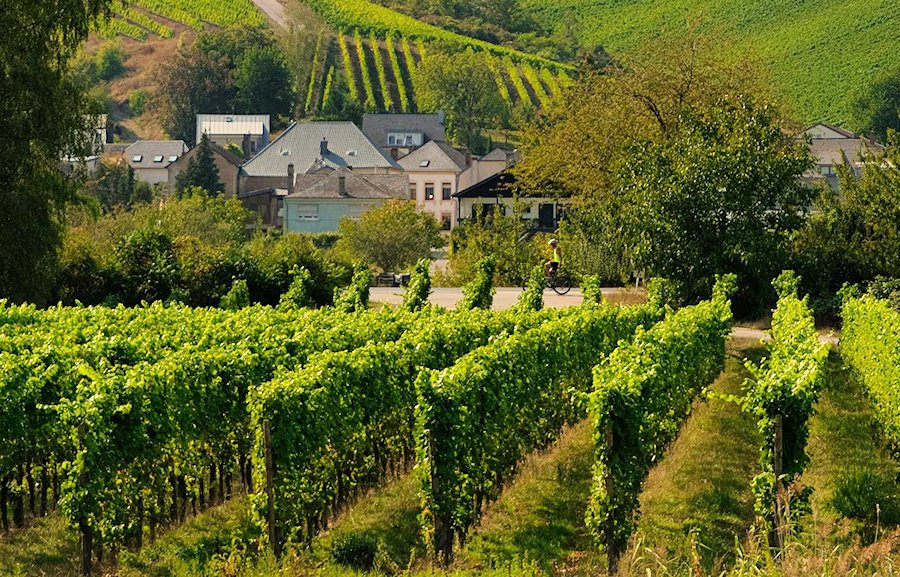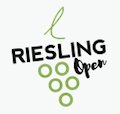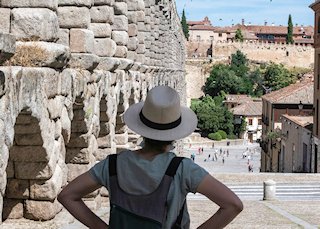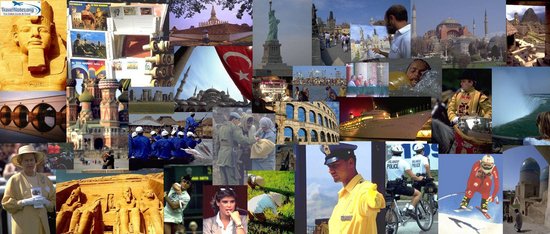Travel Notes: Destinations: Europe: Luxembourg - Luxembourg Moselle Travel Guide.
Short URL: https://tnot.es/LuxMoselle
Travel Guide For Visitors to Luxembourg Moselle
The Luxembourg Moselle is a picturesque region in the east of Luxembourg, along the 42km Moselle River natural border between Luxembourg and Germany. Share on Facebook
Excellent For Wine Lovers and Culture Seekers
This charming region is a must-visit for travellers keen on exploring vineyards, quaint villages, and riverside promenades, all within a compact and easily accessible area.
 Add a Business -
Add a Location -
Add a Lodging - Add Travel Content
- Add URL
- Travel Services.
Add a Business -
Add a Location -
Add a Lodging - Add Travel Content
- Add URL
- Travel Services.
Visiting The Moselle Region of Luxembourg
Situated along the serene Moselle River, Luxembourg Moselle offers a refreshing blend of scenic beauty, rich history, and world-class wine experiences.
Forget everything you think you know about Luxembourg being just a financial hub or a quick stopover between France and Germany.
The Luxembourg Moselle region, stretching along the country's eastern border, is quietly producing some of Europe's most underrated wines whilst serving up picture-perfect village charm that'll have you questioning why you've been overlooking this pocket-sized paradise.
With just 1,300 hectares of vineyards producing predominantly crisp white wines, this might be one of the world's smallest wine regions, but what it lacks in size, it more than makes up for in character, quality, and sheer bloody-minded determination to prove the doubters wrong.
TThe river Moselle itself originates in the Vosges mountains in France and flows through north-eastern France, Luxembourg, and western Germany before joining the Rhine.
Why the Luxembourg Moselle Should Be on Your Travel Radar
The Luxembourg Moselle isn't trying to be the next Bordeaux or Burgundy; and that's precisely what makes it special.
This 42-kilometre stretch of river valley offers an authentic wine experience without the pretension, crowds, or eye-watering prices you'll find elsewhere.
What makes this region genuinely worth your time is that the winemakers still have time to chat, the villages haven't been turned into tourist theme parks, and you can cycle between vineyards on dedicated cycle paths; without dodging tour buses every five minutes./p>
Getting Your Bearings - Geography and Layout
The Luxembourg Moselle region hugs the river border with Germany, creating a natural wine corridor that's been cultivated for over 2,000 years.
The region stretches from Schengen in the south to Wasserbillig in the north, taking in 23 wine-producing communes along the way.
The landscape is classic river valley terrain; south-facing slopes catching maximum sunshine, limestone and clay soils providing excellent drainage, and the Moselle River creating the perfect microclimate for viticulture.
It's geography doing exactly what it should; making life easy for grape growers and scenic for visitors.
Wine Varieties - What's Growing in Luxembourg
The Sparkling Success Story
Crémant de Luxembourg deserves special mention.
This traditional method sparkling wine is genuinely excellent and represents outstanding value compared to Champagne.
Made primarily from Pinot Blanc, Riesling, and Chardonnay, it's crisp, elegant, and perfect for celebrating your discovery of Luxembourg's wine scene.
The White Wine Specialists
Luxembourg's winemakers have wisely focused on what works best in their climate; predominantly white varieties that thrive in the region's continental conditions.
Riesling leads the charge, producing wines with that classic balance of fruit and acidity that makes German Riesling famous.
Luxembourg's versions tend to be slightly rounder and more approachable than their German cousins.
Pinot Blanc and Auxerrois are the reliable workhorses, creating fresh, food-friendly wines perfect for the region's hearty cuisine.
Gewürztraminer adds aromatic complexity, while Pinot Gris provides fuller-bodied options for those who prefer more weight in their glass.
Top Wine Villages and Producers to Visit
Grevenmacher - Historic Charm
This medieval town combines wine tourism with genuine historical interest. The **Caves Bernard-Massard** offer underground cellar tours, while the town's ancient walls provide atmospheric backdrops for vineyard walks.
Remich - The Unofficial Capital
Remich bills itself as the "Pearl of the Moselle" – a claim that's only slightly over-ambitious. This riverside town serves as the region's wine tourism hub, with several major producers offering tastings and tours./p>
**Caves St Martin** and **Domaine Alice Hartmann** are excellent starting points, offering comprehensive introductions to Luxembourg wine styles. The town's riverside promenade is perfect for post-tasting strolls.
Wellenstein - Serious Wine Territory
Wellenstein takes its wine seriously, hosting the annual **Riesling Open** festival and housing some of the region's most respected producers. **Domaine Viticole Mathis Bastian** consistently produces outstanding Rieslings that showcase the region's potential.
Wine Festivals and Events
Festival des Vins (September-October)
The region's premier wine festival takes place across multiple villages, offering unprecedented access to producers and their wines.
It's less touristy than many European wine festivals, meaning genuine opportunities to engage with winemakers.
Riesling Open
Individual producers open their doors for focused Riesling tastings; perfect for understanding how different terroirs and winemaking approaches affect this noble grape.
Where to Stay
Guesthouses and B&Bs in smaller villages provide authentic experiences and local insights.
Many are run by wine-producing families.
A number of hotels in the region offer wine-focused accommodation with vineyard views and excellent regional cuisine.
Tourist Map of Luxembourg
Use the Tourist Map of Luxembourg to help you decide where to stay in Luxembourg based on travel budget, preferred location, planned must-see attractions and local must-do activities.
Practical Information for Wine Region Tourism
Dining and Food Pairing
Luxembourg cuisine perfectly complements local wines.
Friture de la Moselle (fried river fish) - ideal with Pinot Blanc.
Judd mat Gaardebounen (smoked pork with broad beans) - pairs beautifully with Riesling.
Quetschentaart (plum tart) - surprisingly good with Gewürztraminer.
Getting There and Around
By Bicycle
The Moselle Cycle Path is purpose-built for wine tourism, connecting vineyards and villages via gentle, well-maintained routes.
E-bike rentals available in most towns.
By Car
Renting a car is the most flexible option, with excellent roads connecting all wine villages.
Designated drivers are essential if you intend on tasting the grape and don't want to fall foul of the law; local police take drink-driving seriously.
From The River
Regular boat cruises provide a different perspective of the landscape, combining relaxation with sightseeing.
The Luxembourg Moselle Wine Route
Visitors with their own wheels can explore the region via scenic routes that wind through vineyards and picturesque villages.
Remich – Stadtbredimus – Greiveldange – Lenningen – Ehnen – Wormeldange – Ahn – Machtum – Oberdonven – Grevenmacher - Mertert – Lellig – Manternach - Berg – Betzdorf – Ollingen – Flaxweiler – Beyren – Canach – Roedt – Waldbredimus – Dalheim – Mondorf-les-Bains – Burmerange – Remerschen – Schengen – Schwebsange – Bech-Kleinmacher – Wellenstein - Remich
For those interested in culture, local festivals and wine tastings provide authentic opportunities to mingle with residents and soak up the friendly atmosphere.
Beyond wine, the region boasts picturesque towns like Remich and Grevenmacher, each offering delightful cafés, historical sites, and lively markets.
Beyond the Vineyards - Cultural Attractions
European Museum Schengen
Located where the famous Schengen Agreement was signed, this museum explores European integration history while offering Moselle river views.
Nature and Outdoor Activities
The Moselle Nature Park offers hiking trails through vineyards and forests, while the river provides opportunities for boat trips and fishing.
Roman Villa Echternach
Ancient Roman ruins demonstrate the region's 2,000-year winemaking heritage, providing historical context for modern wine tourism.
When to Visit
April to October offers the best weather for outdoor activities and vineyard exploration.
September and October provide harvest season atmosphere, though advance booking essential for accommodations.
Winter visits have their own charm; with fewer crowds, cosy wine cellars, and the opportunity to taste newly released wines from the previous vintage.
Insider Tips for Wine Tourists
Book Tastings in Advance
Small producers often require appointments, especially during busy periods.
Learn Basic Wine German*
Many producers are more comfortable discussing technical aspects in German.
Try Before You Buy
Luxembourg wines rarely export, making tastings your only opportunity to experience them.
Visit Smaller Producers
The most interesting wines often come from family operations in lesser-known villages.
Appreciating The Luxembourg Moselle Region
The Luxembourg Moselle region succeeds because it doesn't try too hard.
It's a genuine wine region that happens to welcome tourists, rather than a tourist destination that happens to make wine.
The wines are increasingly impressive, the scenery is undeniably beautiful, and the experience feels authentic in ways that many famous wine regions have lost.
For travellers seeking wine experiences off the beaten track, cultural insights beyond the obvious, and the satisfaction of discovering something genuinely special before everyone else catches on, the Luxembourg Moselle delivers everything you didn't know you were looking for.
Whether you're a serious wine enthusiast or simply someone who appreciates good drinks in beautiful settings, this tiny corner of Europe offers disproportionate rewards for those willing to venture beyond the obvious choices.
Planning a Luxembourg Moselle Adventure
The region's compact size means you can experience everything in a long weekend, but the quality of the wines and warmth of the welcome might just convince you to stay a little longer than planned.
More City Travel Guides
Cities in Africa - Cities in America - Cities in Asia - Cities in Australasia - Cities in Latin America - European Destinations - Middle East.
More From Travel Notes
Travel Notes Online Guide to Travel
Africa - Asia - Caribbean - Europe - Middle East - North America - Oceania - South America.
The Travel Notes Online Guide to Travel helps visitors plan their trip with country and city travel guides, local tourist information, reviewed web sites, and inspiring travel content.
Travel and Tourism Guides on Travel Notes
 If you find Travel Notes useful, please take a moment to
like us on Facebook and share with your friends on social media.
If you find Travel Notes useful, please take a moment to
like us on Facebook and share with your friends on social media.
Share on Facebook
Travel Resources
.
Travel & Tourism With Industry Professionals.











